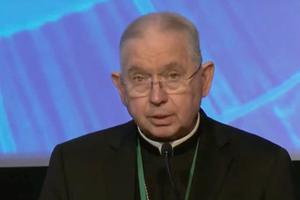Archbishop Gomez Asks For Prayers After Fire at Mission Founded by St. Junípero Serra
Local firefighters said they responded to an initial alarm at 4:24 a.m. and by the time they arrived, smoke and flames were visible from outside the church with more than 50 firefighters needed to bring the flames under control.

LOS ANGELES, Calif. — Archbishop Jose Gomez of Los Angeles has expressed his “terrible sadness” after a fire at a 249-year-old mission church founded by St. Junípero Serra, and asked for prayers for the local Catholic community.
Archbishop Gomez said that the fire at “our beloved Mission San Gabriel Arcángel” early Saturday morning had caused severe damage to the California Historic Landmark.
“The damage is extensive — the roof is destroyed and much of the old church is ruined,” the archbishop reported in a letter released the evening of July 11. “It is terribly sad. Thanks be to God, nobody was hurt.”
The church had been scheduled to reopen on July 18, having been closed for some weeks following the coronavirus pandemic. Archbishop Gomez called the mission, founded by St. Serra in 1771, the “historic cornerstone and the spiritual heart of Los Angeles and the Catholic community here.”
“The family of God was born in this region when St. Junípero Serra and his brother Franciscans established the mission on September 8, 1771,” Archbishop Gomez said.
“It was families from this mission, who in turn founded Los Angeles ten years later, on September 4, 1781, walking nine miles west from the mission, crossing the Los Angeles River, and establishing El Pueblo de Nuestra Señora de los Angeles de Porciuncula, named for the little chapel where St. Francis of Assisi first heard the call of Jesus Christ.”
The archbishop said that “to this day,” the parish at the mission “continues to be a shining expression of the beautiful diversity that God intends for his human family.” A special appeal fund has been established by the archdiocese.
“So, join me please in praying in this sad moment for our brothers and sisters at Mission San Gabriel. May they know the comfort and consolation of our loving Father and the solidarity and care of the entire family of God here in the Archdiocese of Los Angeles.”
Local firefighters said they responded to an initial alarm at 4:24 a.m. By the time they arrived, smoke and flames were visible from outside the church and more than 50 firefighters were needed to bring the flames under control.
Adrian Marquez Alarcon, spokeswoman for the Archdiocese of Los Angeles, said that because of renovations underway at the church ahead of its 250th anniversary, historic paintings and artifacts had been removed and were not in the building at the time of the fire.
No cause has yet been determined for the four-alarm fire, and local firefighters have said that the structure of the mission will have to be secured before a forensic investigation can begin.
The San Gabriel mission was the fourth mission founded by St. Junípero Serra, a Franciscan priest who founded a trail of missions across California, helped to convert thousands of native Californians to Christianity, and taught them new agricultural technologies.
Many of Serra’s missions form the cores of what are today the state’s biggest cities— such as San Diego, San Francisco, and Los Angeles.
An advocate for native people and a champion of human rights, Serra was often at odds with Spanish authorities over the treatment of native people, from whom there was an outpouring of grief at his death in 1784.
Serra was canonized by Pope Francis during a visit to the United States in 2015.
Despite Serra’s record defending indigenous peoples, images of the saint have become focal points for protests and demonstrations across California in recent weeks, with images of the saint being torn down or vandalized in protest of California’s colonial past.

















